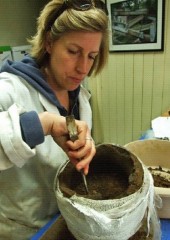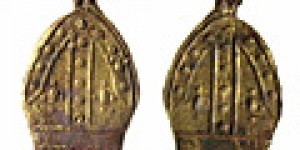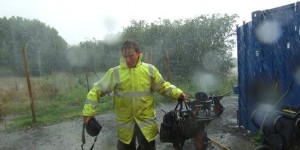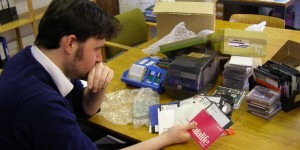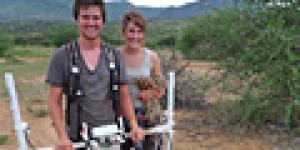What is it like being an international student at the University of York? Here, three students with experience of this give their views on the university, archaeology and the city itself.
Archaeology Abroad - Being an International Student in York by Pia K. Lindholt
In the autumn of 2009 I spent three months studying at the Department of Archaeology at the University of York. I am currently completing my MA in Medieval and Renaissance Archaeology at Aarhus University in Denmark, but at that time I was beginning the third year of my BA. According to the study programme of my home institution a BA-student has to spend the last year of studying in another department so I chose to go abroad and study in York. The planning took almost a year due to administration, but by the beginning of October 2009 I was ready to move to a new and exciting country for three months.
I was met at Manchester Airport by other international students from York and we arrived at campus to be sorted into colleges. I got a room in Halifax College, one of the furthest areas away from the main campus. The University held an International Students' week before the first week of the term. This meant that the first two weeks of my stay in York were filled with introductions to studying in another country and a bit of partying. By the end of this, I was looking forward to going to lectures. Term was only eight weeks of actual studying and one week of exams, compared to at home where the term is twice that, from September to December with exams in January.
Lectures were very similar to lectures in Aarhus but the seminar group work was just amazing. Even though it could sometimes be quite hard to follow the British students' chain of thoughts, it was so nice to be divided into smaller groups to discuss a period or specific topic. I did Medieval Settlement and Economy. Two of the things that were very different from home were writing essays during the term and having to pick and chose for yourself what to read from the curriculum. To do this I would go to the library get out a few books and try to figure out just what to read on a certain topic. The Danish curriculum is very strictly structured and all the students have to read the same texts for the exams.
What struck me at the library and elsewhere on campus was the dedication of my fellow students. In Denmark studying at the university is free and therefore some people do not put as much effort into their studying as they could (or should). At York, however, everyone showed quite a commitment to their chosen subject.
Getting to know the city, of course, took a few weeks. I had to figure out the bus system, where to shop for food and the British way of life in general. Everyone was really nice to help me find my way around and my time in York went by so fast. I enjoyed my stay very much and the experience of living abroad is something I highly value today. I highly recommend spending a term or more at a foreign university.
BA-degree in Medieval and Renaissance Archaeology, Aarhus University:
http://bachelor.au.dk/en/medievalarc/
Study guide for Aarhus University:
Being an International Student at York by Alex Jasinski
When I first stepped off the train into the sunlit streets of York I had no exact idea of what to expect. I suppose I did have some vague expectations that involved excavations, skeletons and being taught by gentlemen in tweed, but nothing overly specific. Now, looking back, it is easier to track the highlights and the low points of this academic adventure than the overall flow. In the first year, one such highlight definitely came as an end of the year reward with excavation at Heslington East and post-excavation work at King's Manor. Yes, I felt back then that it was exhausting at times and that certain aspects - getting to the place for example - could have been easily improved but the sense of camaraderie and being directly involved in research exceeded any downsides.
I separate year one from year two and three for one good reason - part-time job. I had mixed academia and employment before but never on such a scale for such a length of time. So I cannot stress enough that a part-time job that you have to attend to everyday will affect you. This is not to make an excuse for any underperformance or plain old simple laziness, but you do have to get used to the work schedule and juggle it with academia. Another thing comes into focus when looking for a job is that as an international student you will compete against the English students and most likely you will be at the losing end of that specific competition. So in the end you might settle on an offer which is far, very far from being what you wanted to do or what you might enjoy. That at least was my case.
Second year effectively concluded with an archaeological practice in Greece and I am very thankful to Geoff Bailey and Nena Galanidou for making that possible. This, alongside other opportunities offered by the department (I can name at least three from memory - a recent one in Peru, one in Denmark for a field survey and one in France with Kevin Walsh), shows its active involvement. It is difficult to say without having a direct comparison with other departments, but I feel that all the members of staff care about the student-staff relationship and try to do their best to make your time here worthwhile. The fact that I was not English did not change anything in this regard.
Last but not least, let me address the issue of friendships and societies. I have no qualms in saying that the most enduring relationships I formed over my university years stem from my active participation in poetry society. Again and again I would meet people who seem interesting but with whom it might be difficult to find a common ground. You have to bear in mind the upbringing, language and cultural frame of references which inevitability will get in the way. There is nothing to be done about this - you can neither change these aspects nor forget them. The few friendships I have established were all based on shared love of literature which makes me biased against other forms of human interaction and inventiveness, with sports and student libations being the most practiced counter-examples. So in the end it all boils down to this: find not as much your niche as something that you feel passionate about. It too shall pass but before it does, it will make everything else worth your while.
Dear Post Hole Readers,
I have to admit a little dirty secret - I chose to apply to the University of York because the Archaeology Department's website was easy to navigate. Now this seems like a silly, utterly arbitrary reason to pick any university, but let me take you back to Guam, during the beginning of my senior year at high school...
At seventeen, I absolutely knew I wanted to be an archaeologist and furthermore, I wanted to study in England (as I could not have been bothered with the general education requirements of most U.S. schools, nor particular desired to first read a degree in anthropology). After going through the usual motions of soliciting advice from teachers, requesting prospectuses from universities, and searching for information from their websites, I discovered that most English university websites were vastly unorganized for international students! How was I supposed to find out what classes I would need, or if my diploma would be transferrable? What about all those expensive Advanced Placement classes and exams for which my mom paid?
Clearly, as a teenager, this was daunting. I was applying to universities half way around the world, investing a great amount of my parent's money into their tuition, and I could not for the life of me find what these universities wanted from me! The relief I found in York's website was tremendous. It was straightforward, detailing how many AP exams and what grades and SAT scores were key to consideration and acceptance.
Fast forward ten months later: I found myself dragging my suitcases and mother across campus in a determined manner. I was not going to feel terrified at the fact that I knew absolutely nothing about York or the university I was traversing. However, my poor mother realised that I had not really thought this big move through, berating me for not knowing where I was going or where I would be living that year... The snail mail with my accommodation letter had not reached Guam when I left in October. Oh, it brings a smile to my face to remember that day!
I remember realising very early on in my undergraduate degree that I was very fortunate of three things: the first being that York is a beautiful, medium-sized city with easy connections to the countryside and bigger cities; while the second was the fact that the university's Archaeology Department was the best in the country (that is not just boasting; we were top of the league tables that year); and finally, the weather was not the stereotypical grey skies and non-stop rain I had been lead to believe it was. There were quite a few Americans around the department, along with various other nationalities, and the majority of people on my course were friendly and always up for the pub. As my last article attests to, I fell in love with the department and city, and have stayed on for an extra year to do my MSc.
My experience as an international student is probably the result of auspicious events, with a few happy accidents along the way. I was fortunate to receive an offer from a department that regularly dealt with international students, and a university with a large international community. Their experience led to me having a fairly pleasant time as an undergraduate, and a desire to continue my higher education. Thank God for that website!
Best of luck,
Christina Cartaciano


